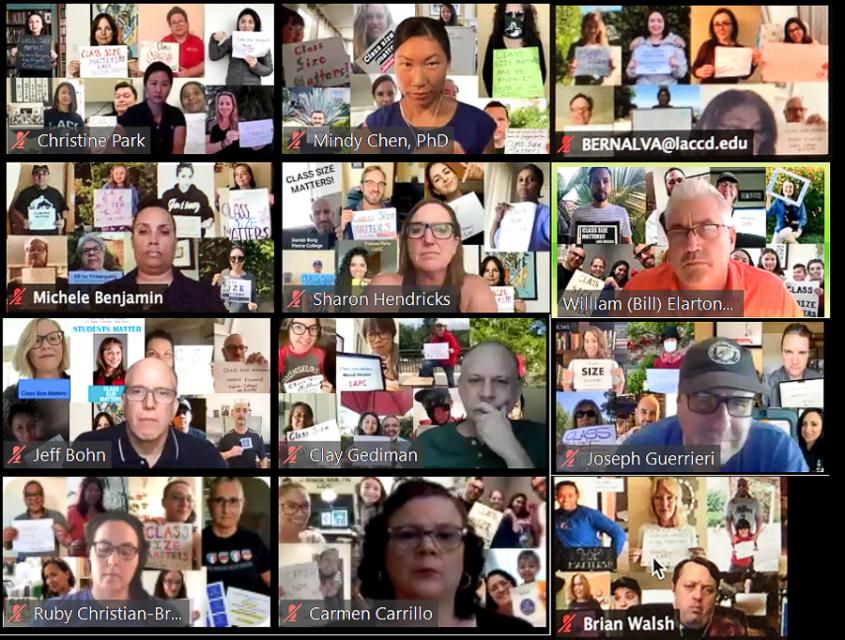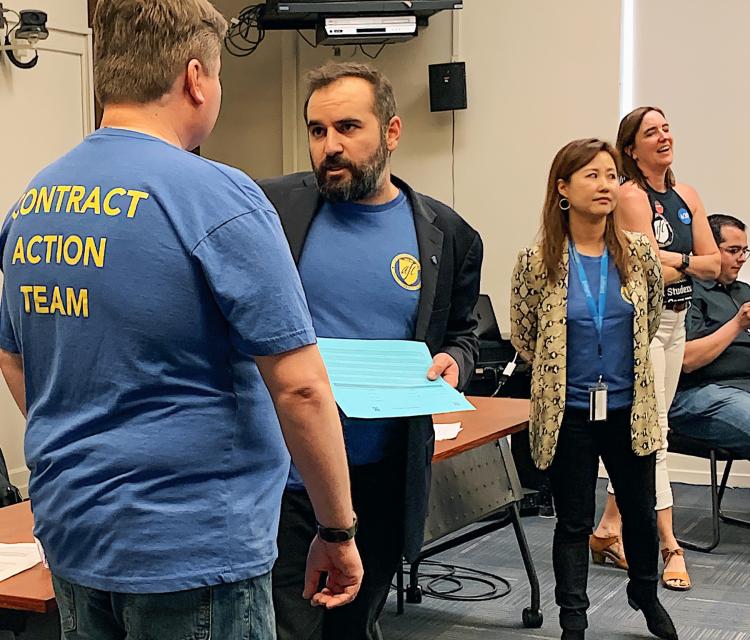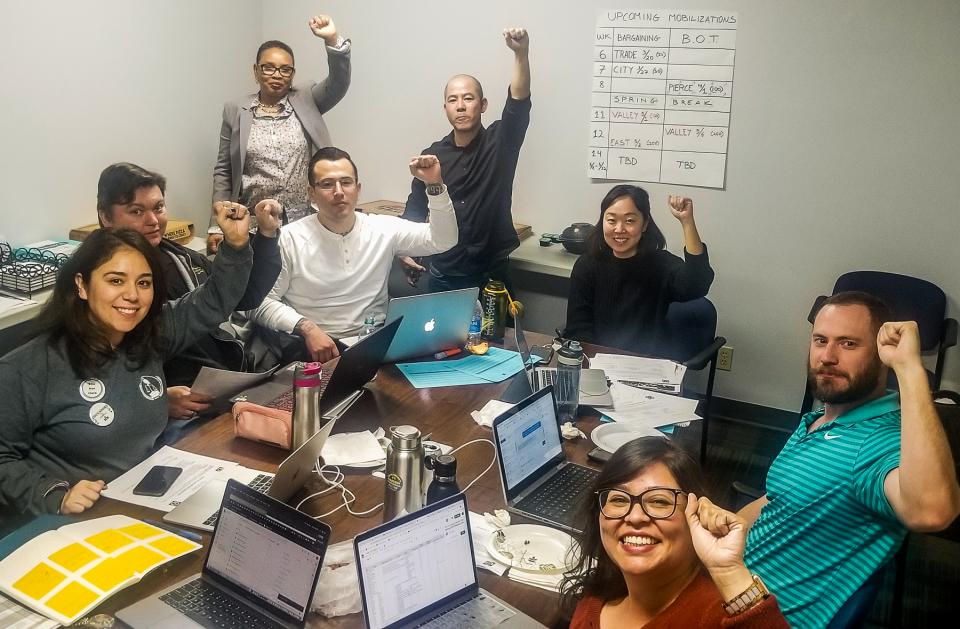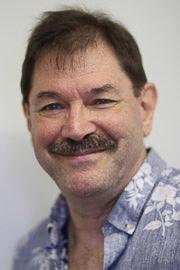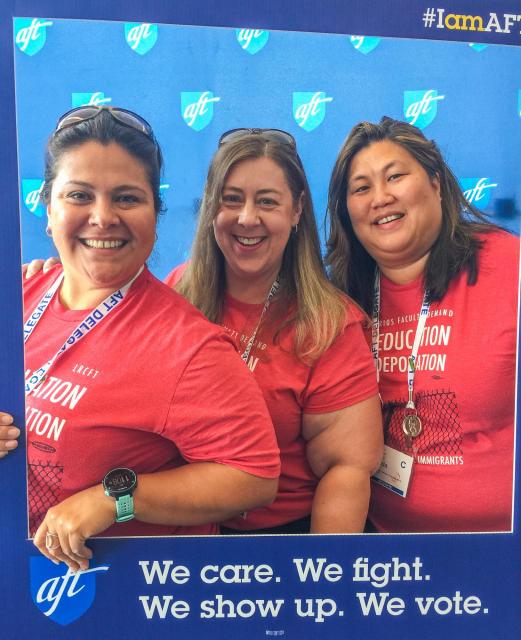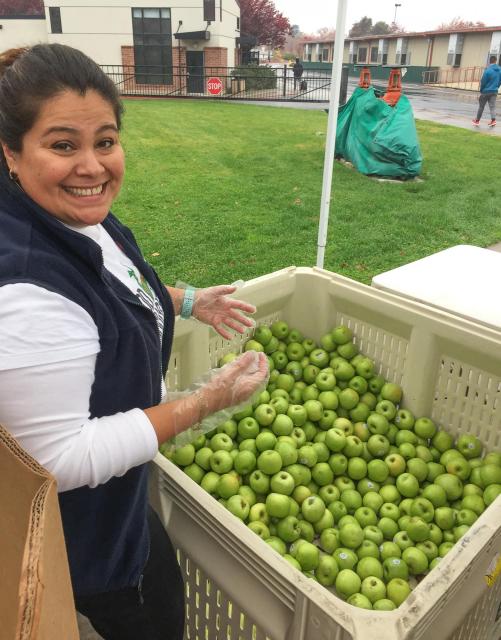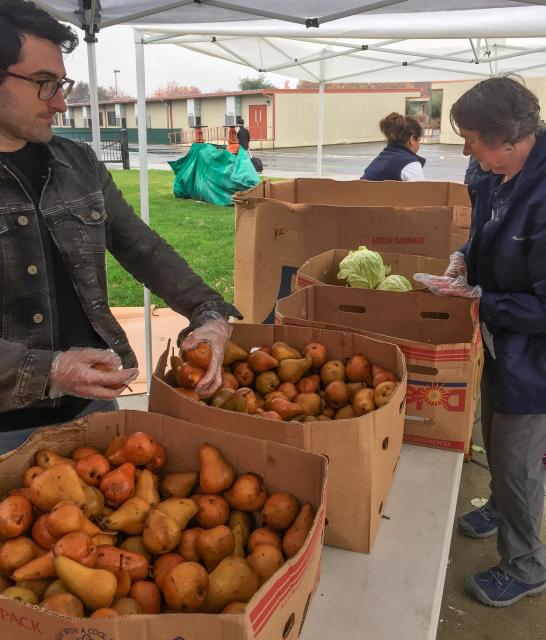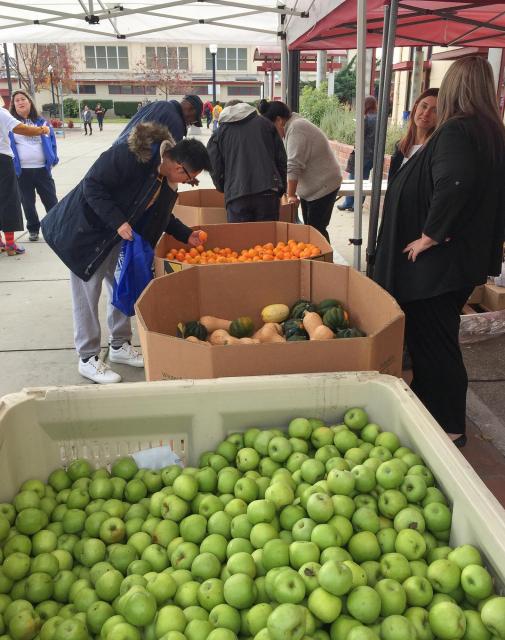Strong organizing has meant workplace gains and more political power for faculty during the pandemic, with members showing up in larger than ever numbers to virtual bargaining sessions and meetings.
All this while millions, many who are out of work, struggle to meet basic needs. Food insecurity has more than doubled throughout the state, and in some counties, it’s tripled. With such widespread devastation affecting students, their families, and some members, unions are stepping up to find new ways to make a difference in their campus communities.
• • •
Strong organizing in L.A. yields epic results
At the end of last year, Chase Golding came to the Los Angeles Faculty Guild, AFT Local 1521, as organizing director, joined a couple months later by lead organizer SeoYun Son. They wanted build power on the nine campuses, so they organized a Contract Action Team, or CAT, at each campus. The immediate goal was to pressure management to agree to demands at the bargaining table, Golding said, but they also wanted to leave a system in place for future organizing.
“CATs are formalized faculty-to-faculty networks for mobilizing and communicating to our members,” he said. “We built teams at nine campuses, and each had a lead, and they recruited five to ten members and they recruited more, like a phone tree.”
The large numbers — 512 members showed up at the meeting about class size — got the attention of management, leading to big gains for the local. No cuts were made to healthcare, jobs or pay, Son says. For the first time, class size limits were included in the contract — 42 rather than management’s proposed 59. The local organized actions, like getting more than 200 faculty members to send class size selfies to the seven members on the Board of Trustees. Yun says members also did things like making their usernames “Class sizes matter,” or changing their Zoom backgrounds to photos of union members holding up signs.
The members’ power also translated to protecting faculty rights for teaching in a pandemic. When the district proposed suspending the faculty contract, they fought back and signed four Memoranda of Understanding, pushing up spring break and using the time to transition to distance learning, suspending evaluations, and modifying requirements to teach online after moving about 8,000 classes from in person to online in just a week and a half.
Golding says through the CATs, the faculty are mobilizing for the November election, phone banking for Proposition 15, Schools and Communities First, which would eliminate tax protection on large commercial properties, generating an additional $12 billion a year for local governments, schools and community colleges. They are also phone banking for four community college trustees, posting to social media under #collegeswealldeserve.
• • •
Elections mattered in Glendale
Members of the Glendale College Guild, AFT Local 2276, have seen how much elections matter. The Board of Trustees held district elections in March, with two open seats. Roger Bowerman, the Guild’s president until recently, says for the first time the local recruited people to run for the open seats, looking for candidates with a strong union background, an understanding of equity and community engagement.
Along with trustees, the local had three city council candidates on a slate. All the people they backed won. This means good communication with local elected officials, Bowerman says, and they can lobby officials on things like making statements supporting important issues, such as the importance of Proposition 15.
The union has also gotten MOUs to support teachers during the pandemic. These include faculty members’ professional development requirements being included in distance learning training, possible leaves for faculty members who live with someone elderly or at high risk for COVID-19, and getting faculty members ergonomic desks and chairs for teaching at home.
One thing they want to work on is social justice issues, such as affordable housing and racial equity, Bowerman says, and having a board and a council they can work with helps.
“Unions function best when they address social justice issues,” he said. “We’ve raised money for students impacted by COVID. One third of our students live with food insecurity, and there’s more commitment to the union when people see we’re not just helping professors, but helping the community.”
• • •
Sacramento faculty help feed the hungry
Veronica Lopez and Kalinda Jones, with the Los Rios College Federation of Teachers, AFT Local 2279, also think social justice issues give union members a way to get involved, and they formed the Social Justice Caucus in 2018, focusing on food insecurity, undocumented students, and prison education.
“It provides on-ramps for our members to be involved,” said Jones, who teaches social work and psychiatry. “And the union’s involvement elevates these issues.”
The local’s MOU says faculty members can’t be on campuses without special permission, and Jones has done that, going once a week to pick up materials for other teachers. She teaches at a prison, so she also meets with prison officials once a week in a parking lot to pick up packets of completed work and to pass on packets of work for her incarcerated students.
The caucus has allowed them to hear from people at other campuses, Jones says. “We learn what’s going on and what issues are important to members. It gives us more power to organize by centrally locating it within the union.”
Lopez, who teaches nutrition, agrees that getting to know members across campuses is key. She says they have worked with the food bank in Sacramento, which now supplies food at three out of four campuses, and as chair of the caucus, she wants to keep developing relationships.
“I knew that if my students come into the classroom hungry, my job is that much more challenging,” she said. “It’s good for us to know people in the community, and that allows us to engage union members in a different way. We are all human and at some point, we all need a little bit of help. Getting to know colleagues across campuses and making those connections is fundamental to unionism.”
— By Emily Wilson, CFT Reporter

